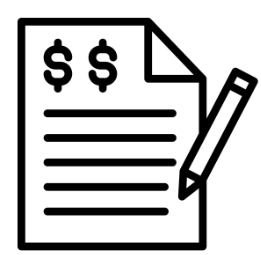Professional Business Writer
Let’s take your business to the next level today!

Business Attributes for Priming Grant Success
Learn why top executives and startup entrepreneurs rely on Grand Business Plans time and time again.

Research that is Reliable
Grand Business Plans offers access to the same market research as leading investment banks and venture capital companies, and only uses the most trustworthy data

Completely unique
Clients work directly with a business plan expert with investment banking experience to understand your company’s unique business model.

Professional team
Grand Business Plans’ specialist team is more competent and experienced than any other firm. All of the members have worked in the investment banking industry.

Assistance with a Bank Loan
Grand Business Plans can ensure that you get the best financing terms and the best chance of getting approved by the bank.

Financial Statements Details
When it comes to financial projections, Grand Business Plans only uses the most reliable research. Take advantage of the industry’s best analysts.

Guarantee Customer Satisfaction
Because Grand Business Plans has never had a dissatisfied customer, it offers a money-back guarantee to all of its customers.
Creating a comprehensive business plan involves a series of structured steps to ensure that all critical aspects of the business are well-thought-out and effectively communicated.
Steps Involved
By following these steps, we ensure that your business plan is not only comprehensive and realistic but also compelling and persuasive to potential investors. Our goal is to equip you with a solid plan that will guide your business to success.
By following this structured approach, Grand Business Plan ensures that each business plan is tailored to the specific needs of our clients, providing them with a robust foundation to secure funding and achieve their business goals.
At Grand Business Plan, we specialize in creating compelling business plans for Priming Grant applications, ensuring your startup has the best chance of securing funding from Enterprise Ireland. Whether you’re exploring how to write a grant to start a business or need help with a business plan for government funding, our experienced team is here to guide you.

Bank Compliance
We ensure your grant business plan is fully compliant with bank requirements, including comprehensive sections on market research, strategic planning, financial projections, and your business model example. This attention to detail increases your credibility and funding potential.

Experienced Consultants
Our team of MBA-qualified consultants has over 10 years of experience working with global market leaders. They bring extensive expertise to writing a business proposal for funding, tailoring solutions that showcase your unique business vision and align with Enterprise Ireland’s requirements.

Customization
All our business plans are fully customized to reflect your unique goals. We never use templates or pre-made designs. Instead, we provide user-friendly, professional documents complete with full-color charts, graphs, and tables. This ensures your priming grant business plan example stands out to stakeholders and funders.
Trust Grand Business Plan to help you create a business plan for grant application that accelerates your journey from idea to reality. Let us help you secure your priming grant and set your business on the path to success.
Applying for a priming grant or other funding opportunities requires a comprehensive approach that addresses the critical criteria funders use to evaluate proposals. Whether you’re writing a business plan for a grant application or drafting a startup funding proposal, focusing on the following elements can significantly enhance your chances of success.
Your project must address a specific need or problem within the target sector or community. Clearly align your goals with the grant’s objectives, showcasing how your initiative aligns with the priorities of funders and demonstrates a meaningful impact.
A detailed implementation plan is essential for convincing funders of your project’s feasibility. Outline your timeline, key activities, milestones, and required resources. Include details about roles and responsibilities for team members involved in the project, ensuring transparency and clarity.
A robust and well-organized budget is a cornerstone of any business priming grant application. Break down costs into clear categories—such as personnel, materials, and operational expenses—and provide a strong rationale for each line item. Highlight financial responsibility and sustainability to build funders’ confidence.
Funders are interested in measurable outcomes and methods for evaluating project success. Specify the metrics you will use to assess impact, ensuring that your approach is realistic, quantifiable, and directly tied to your project’s goals.
Planning for long-term success is vital for any grant application. Clearly outline your strategy for sustaining the project beyond the grant period, including potential revenue streams, partnerships, or additional funding sources.
By addressing these key aspects, your priming grant business plan will demonstrate your preparedness, strategic vision, and alignment with funders’ expectations, increasing your likelihood of securing critical support.
By addressing these key criteria in your grant business plan or startup funding proposal, you increase your likelihood of securing the financial support needed to successfully execute your project. A well-structured proposal not only highlights your project’s relevance but also demonstrates its feasibility, sustainability, and impact.
By conducting a thorough SWOT analysis, the farm can better position itself to leverage its strengths and opportunities while mitigating potential threats and addressing weaknesses.
When considering a grant application, understanding the eligibility criteria is crucial. These criteria often determine whether your organisation or project qualifies for funding. While they can differ among grant providers, the following elements are commonly assessed:
By carefully reviewing and adhering to the eligibility criteria, you can strengthen your application and improve your chances of securing funding for your project.
To be eligible for a grant, applicants must meet the following criteria:
To qualify for a priming grant, applicants must meet specific requirements based on their entity type:
Tip: Always confirm that your applicant type matches the grant’s specifications before drafting your startup proposal for funding.
Funders often focus on specific regions or jurisdictions for their grant programs. For example:
Pro Tip: Highlight the geographic relevance of your business plan for government funding and your understanding of local needs.
Grants often prioritize specific industries, such as:
If your project aligns with these areas, emphasize it in your business proposition template.
Funders require proof that your business has a genuine need for the grant:
Key Note: This step is especially important when writing a startup funding proposal or a proposal for startup funding.
Tailoring your business proposal for funding to reflect the funder’s mission increases your chances of success. For example:
Funders may evaluate your business’s previous successes:
By addressing these criteria comprehensively, your startup funding proposal or priming grant business plan example will stand out to evaluators, increasing your chances of securing the grant. If you need further assistance with writing a business proposal for funding or creating a business plan for grant application, our team of experts is here to help!
When applying for a grant, understanding the evaluation criteria funders use is critical to crafting a successful proposal. These criteria guide funders in selecting projects that align with their mission and demonstrate a high likelihood of success. Below are the key factors typically considered during the evaluation process:
By thoroughly addressing these evaluation criteria, your grant business plan or proposal for startup funding will stand out to funders. Tailoring your application to their priorities—whether it’s community impact, sustainability, or innovative methodologies—will improve your chances of securing financial support.
For assistance with writing a business plan for a grant or how to write a grant to start a small business, our expert team is ready to help you craft a compelling and fundable proposal.
Applications will be evaluated based on the following criteria:
Projects with a significant, sustainable impact are prioritized.
Innovative approaches that address problems in new ways are favored.
Projects that are realistic and backed by sound planning are more likely to receive funding.
Projects that benefit the wider community or target population are given preference.
Projects that resonate with the funders’ strategic goals are much more likely to receive support.
By addressing these criteria thoroughly in your grant application or business plan for grant application, you can increase your chances of securing funding. For more guidance on how to start a grant proposal or writing a business proposal for funding, our team of experts is ready to assist you in crafting a compelling and impactful submission.
Follow these steps to apply for a grant:
The process for selecting grant recipients typically involves the following steps:
By following this comprehensive process, applicants can maximize their chances of successfully securing funding through well-prepared applications and proposals. Need help with your application? Our team offers expert guidance on writing a business proposal for funding and crafting a compelling priming grant business plan tailored to your project.
Use this checklist to ensure your application is complete and meets all requirements:

☑️ Review the grant’s eligibility criteria and confirm your project and organisation qualify for funding.

☑️ Draft a clear, concise proposal that aligns with the grant’s objectives and demonstrates the project’s significance, feasibility, and impact.

☑️ Create a detailed budget outlining project costs, funding needs, and allocation of resources. Ensure alignment with the grant’s funding priorities.

☑️ Proof of business registration. Permits and licenses. Financial statements. Any additional materials requested by the grant provider.

☑️ Fully completed with accurate details. Properly formatted according to the grant guidelines. Compliant with any word or page limits.

☑️ Submit your application on time using the correct platform or submission method specified by the grant provider.

☑️ Assess your application to ensure it addresses all evaluation points, such as impact, sustainability, feasibility, and alignment with the grant objectives.

☑️ Share your application with trusted advisors, colleagues, or grant writing professionals for constructive feedback to enhance its quality and competitiveness.
By following this checklist, you can ensure your grant application is polished, complete, and stands out during the evaluation process. Need help writing a business plan for a grant or crafting a startup funding proposal? Let us assist you in achieving success!
When applying for grants, certain pitfalls can diminish the chances of success. Here are some common mistakes to avoid:

Neglecting Guidelines
Mistake: Ignoring the grant’s instructions regarding format, length, and required documents can result in immediate disqualification.
Solution: Carefully read and adhere to the grant guidelines. Use the correct format, ensure your application is within word/page limits, and include all necessary attachments.

Vague Objectives
Mistake: Submitting unclear or overly broad project objectives can confuse evaluators and weaken your application.
Solution: Clearly define measurable, achievable goals that align with the grant’s mission. Use specific language to demonstrate how your project will achieve its desired outcomes.

Insufficient Budget Justification
Mistake: Providing a budget without explaining how funds will be used may raise concerns about accountability.
Solution: Include a detailed budget breakdown and justify each expense by explaining its relevance to the project’s success.

Lack of Collaboration
Mistake: Not highlighting partnerships or community involvement may reduce the perceived viability of your project.
Solution: Showcase collaborations with local organisations, experts, or community stakeholders to emphasise the impact and sustainability of your project.

Ignoring Evaluation Criteria
Mistake: Failing to address the funder’s evaluation criteria can result in lower scores and missed funding opportunities.
Solution: Carefully review the evaluation criteria and structure your proposal to explicitly address each requirement.

Basic Errors
Mistake: Spelling mistakes, grammatical errors, and formatting issues can undermine your application’s professionalism.
Solution: Proofread your application thoroughly, or have a trusted colleague or professional editor review it for accuracy and consistency.

Not Seeking Feedback
Mistake: Submitting a proposal without external input often leads to missed opportunities for improvement.
Solution: Share your draft with colleagues, mentors, or grant-writing professionals for constructive feedback. Use their insights to refine and strengthen your application.
Avoiding these common mistakes can significantly improve your grant application’s quality and increase your chances of success. Need help with writing a business plan for a grant or creating a compelling startup funding proposal? Contact us for expert assistance!
Organization Type: Non-Profit
Project: Tackling Childhood Obesity
Why It Succeeded:
Organization Type: Educational Institution
Project: STEM Education for Underprivileged Youth
Why It Succeeded:
Organization Type: Small Business
Project: Sustainable Packaging Solutions
Why It Succeeded:
To enhance your chances of success, consider the following tips when preparing your grant application:
By integrating these strategies into your application process, you’ll enhance the quality and competitiveness of your proposal, significantly increasing your likelihood of securing the grant. For professional assistance in writing a business proposal for funding or creating a business plan for grant applications, contact our team today!
A priming grant is financial support provided to startups or small businesses to help them grow and succeed. It typically covers essential expenses like hiring, equipment, marketing, or other startup costs. Having a priming grant business plan ensures you can demonstrate how the funds will be used effectively.
To write a business plan for grant application, include a detailed executive summary, project objectives, and a section on financial projections. Clearly outline how the funds will be used and explain how your project aligns with the grant’s objectives. A priming grant business plan example can provide valuable guidance for structure and content.
When writing a business proposal for funding, follow these steps:
A startup funding proposal should include:
A priming grant business plan is essential for demonstrating to funders how their financial support will be used. It highlights your goals, outlines detailed financial projections, and explains how the funding will drive growth. A well-prepared plan ensures your application is compelling and stands out among competitors.

Place the order
Place your request using our short online order form, which will provides us with the background information we need to begin the project.

Project proposal
Within 3 hours, an expert will contact you to discuss the particulars of your case. We will then prepare a detailed proposal covering our proposed approach, team, relevant experience, credentials, timing and fees.

Final Report
Once we have reviewed your feedback and responded by making the necessary revisions, we will issue the final draft of your report.
Contact Us
Unit 80, Cherry Orchard Business Park, D10NX96, Dublin 10, Ireland
Monday – Saturday: 08:30 to 20:00
Sunday: Closed
Email: info@grandbusinessplan.com
Telephone: +353 1 556 3253
Mobile/WhatsApp: +353 85 888 2817
Crafting bespoke business plans tailored to your unique vision and goals is our expertise at Grand Business Plan. Whether you’re launching a start-up or expanding an existing business, our comprehensive services ensure strategic clarity and investor appeal. Trust our experienced team to guide you through every step of creating a robust business plan that drives success.
NEED AN ACCOUNTANT? WE ALSO ASSIST IN THE ACCOUNTING FIELD WITH OUR EXPERT TEAM.
MOST POPULAR
SERVICES
info@grandbusinessplan.com
Phone : +353 1 556 3253
Mobile: +353 85 1 477625
FOLLOW US

Office Address
Unit 80, Cherry Orchard Business Park, D10NX96, Dublin 10, Ireland
info@grandbusinessplan.com
Phone: +353 1 556 3253
WhatsApp: +353 85 1 477625
© 2025 Grand Business Plan ®All rights Reserved